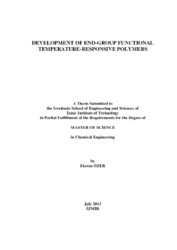Please use this identifier to cite or link to this item:
https://hdl.handle.net/11147/3594Full metadata record
| DC Field | Value | Language |
|---|---|---|
| dc.contributor.advisor | Bulmuş Zareie, Esma Volga | en |
| dc.contributor.author | Özer, Ekrem | - |
| dc.date.accessioned | 2014-07-22T13:51:54Z | - |
| dc.date.available | 2014-07-22T13:51:54Z | - |
| dc.date.issued | 2013 | en |
| dc.identifier.uri | http://hdl.handle.net/11147/3594 | - |
| dc.description | Thesis (Master)--Izmir Institute of Technology, Chemical Engineering, Izmir, 2013 | en |
| dc.description | Includes bibliographical references (leaves: 54-58) | en |
| dc.description | Text in English; Abstract: Turkish and English | en |
| dc.description | x, 78 leaves | en |
| dc.description | Full text release delayed at author's request until 2015.08.06 | en |
| dc.description.abstract | The aim of this thesis was to synthesize temperature-responsive, well-defined, end-group modified (co)polymers of oligoethyleneglycol methyl ether methacrylate (OEGMA300) and diethyleneglycol methyl ether methacrylate (MEO2MA) via reversible addition fragmentation chain transfer (RAFT) polymerization, and to investigate in detail the temperature-responsive behaviour of the resultant (co)polymers considering the possible use of these (co)polymers in temperature-controlled biosensing applications. A series of (co)polymerization kinetic experiments were performed at three different [Total monomer]/[RAFT agent] molar ratios and yielded copolymers of OEGMA300 and MEO2MA with controlled molecular weights and low polydispersities (<1.2), indicating RAFT-controlled (co)polymerization mechanism. The reactivity ratios of the comonomers, MEO2MA and OEGMA300, determined using Kelen-Tüdŏs method were 0.96 and 0.98, respectively. This indicated that the copolymers were truly random and their composition could be controlled by the feed comonomer composition. A number of (co)polymers having varying molecular weights, compositions and end-group functionalities (i.e. thiocarbonylthio RAFT end-group, pyridyldisulfide (PDS) or phosphonate group) were synthesized to investigate the effects of these parameters on the Lower Critical Solution Temperature (LCST) of the (co)polymers. The end-group functionality, PDS or phosphonate, was chosen considering the possible use of these polymers on gold or alumina surfaces, respectively. The key factor affecting the LCST was found to be the hydrophilic/hydrophobic balance of the (co)polymers. Increasing the hydrophilic content (OEGMA content) of the (co)polymers increased the LCST values. The effect of end-group on the LCST was more profound for (co)polymers with low molecular weights. Replacement of the thiocarbonylthio end-group with a more hydrophilic group such as PDS or phosphonate resulted in a significant increase in the LCST of the copolymers having a degree of polymerization of less than 30. For the copolymers with higher degree of polymerization, the influence of the end-group chemistry on the LCST became negligible. | en |
| dc.language.iso | en | en_US |
| dc.publisher | Izmir Institute of Technology | en |
| dc.rights | info:eu-repo/semantics/openAccess | en_US |
| dc.subject.lcsh | Polymers | en |
| dc.subject.lcsh | Polymers--Thermal properties | en |
| dc.title | Development of end-group functional temperature-responsive polymers | en_US |
| dc.type | Master Thesis | en_US |
| dc.institutionauthor | Özer, Ekrem | - |
| dc.department | Thesis (Master)--İzmir Institute of Technology, Chemical Engineering | en_US |
| dc.relation.publicationcategory | Tez | en_US |
| item.languageiso639-1 | en | - |
| item.fulltext | With Fulltext | - |
| item.openairecristype | http://purl.org/coar/resource_type/c_18cf | - |
| item.openairetype | Master Thesis | - |
| item.grantfulltext | open | - |
| item.cerifentitytype | Publications | - |
| Appears in Collections: | Master Degree / Yüksek Lisans Tezleri | |
Files in This Item:
| File | Description | Size | Format | |
|---|---|---|---|---|
| 10011835.pdf | MasterThesis | 2.82 MB | Adobe PDF |  View/Open |
CORE Recommender
Page view(s)
92
checked on Jul 22, 2024
Download(s)
42
checked on Jul 22, 2024
Google ScholarTM
Check
Items in GCRIS Repository are protected by copyright, with all rights reserved, unless otherwise indicated.